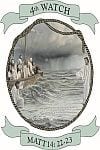Podcast: Download (32.4MB)
Subscribe: RSS
 In the last podcast I talked about depression and now add anxiety and PTSD will be added to the mix of mental and emotional issues we may have to deal with in this life.
In the last podcast I talked about depression and now add anxiety and PTSD will be added to the mix of mental and emotional issues we may have to deal with in this life.
These issues can cause cognitive dissonance in our relationship with the Lord and His Church and create unintended consequences from our perceptions of world. We often don’t see the world the way it is. We see it more as we are. If we are viewing our life as full of danger and threats it may be because we have experienced events in our lives that foster those feelings.
In this podcast we look at possible causes of anxiety and post traumatic stress and the counsel we have received from Elder Jeffery R. Holland of the counsel of the twelve apostles.
The book “When Bad Things Happen to Good People” by Harold S. Kushner along with other books he has written is available here.
As always the views and opinions expressed in this podcast may not reflect those of the Church of Jesus Christ of Latter-day Saints or that or FairMormon


 Just in time for Thanksgiving, here’s part two of my interview with John Durham Peters, the A. Craig Baird Professor in communication studies at the University of Iowa. Peters joined me through Skype from his home in Iowa for this two-part episode on Mormonism and Communication (see part 1
Just in time for Thanksgiving, here’s part two of my interview with John Durham Peters, the A. Craig Baird Professor in communication studies at the University of Iowa. Peters joined me through Skype from his home in Iowa for this two-part episode on Mormonism and Communication (see part 1  In part two, Richard Bushman discusses challenges facing Mormon graduate students, his latest book “Mormonism: A Very Short Introduction,” and other subjects including temples, the LDS sacraments, Mormon cosmology, and Zion. Bushman is an award-winning American historian, currently serving as the Howard W. Hunter Visiting Professor in Mormon Studies at
In part two, Richard Bushman discusses challenges facing Mormon graduate students, his latest book “Mormonism: A Very Short Introduction,” and other subjects including temples, the LDS sacraments, Mormon cosmology, and Zion. Bushman is an award-winning American historian, currently serving as the Howard W. Hunter Visiting Professor in Mormon Studies at 